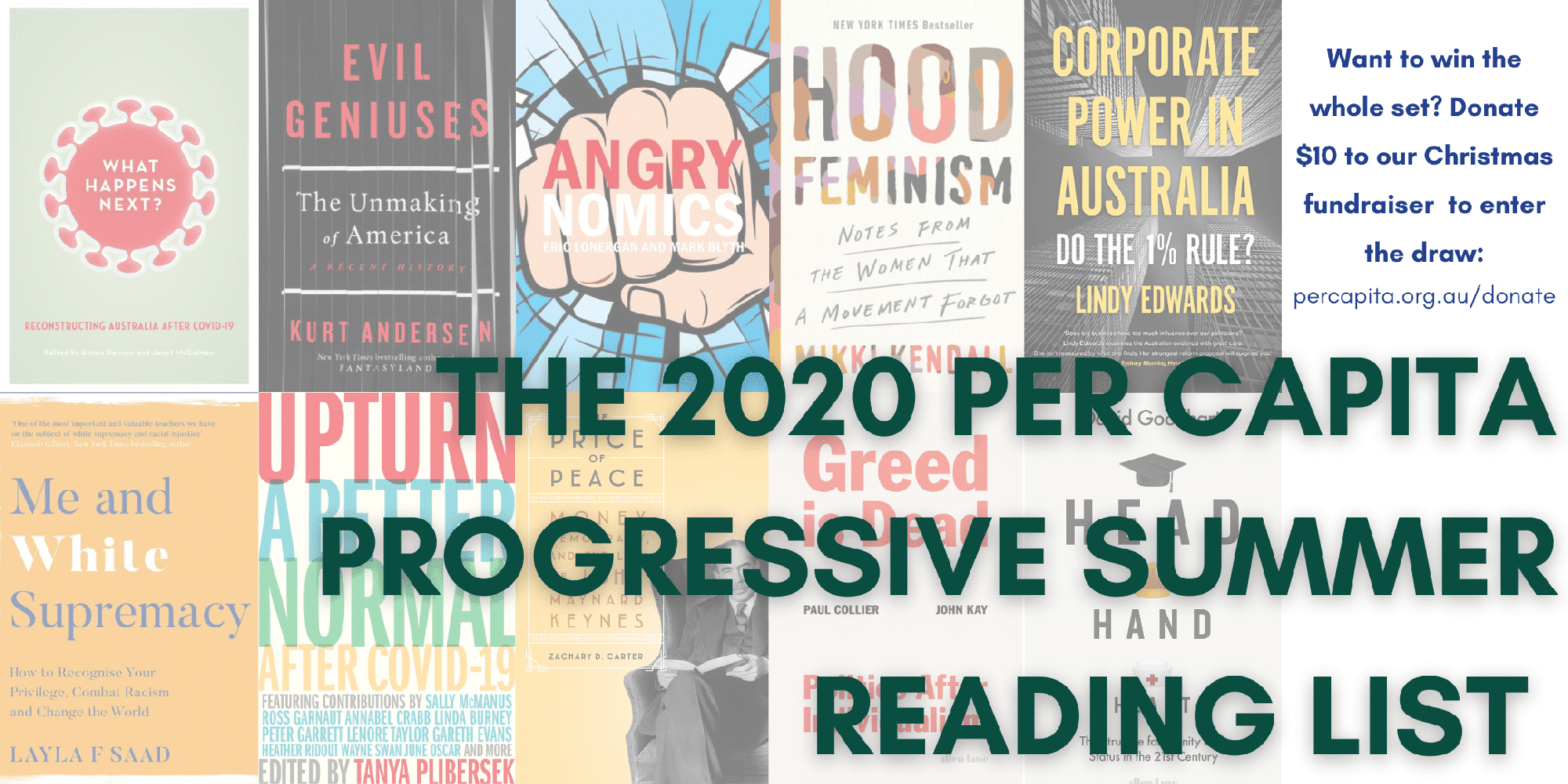It’s December and the sun is out even in Melbourne (or at least, it was yesterday). With the promise of a few weeks of respite from a hellish year just around the corner, the time has come again for us to share our top 10 progressive reads released over the year.
And, for the third year in a row, you have a chance to win them all! To go into the draw to win all 10 books just donate $10 to our summer fundraiser here. Want extra entries? Every $10 donated will get you an extra entry – and make your donation a monthly gift to double your entries.
Now, without further ado…the Per Capita Progressive Summer Reading List 2020.
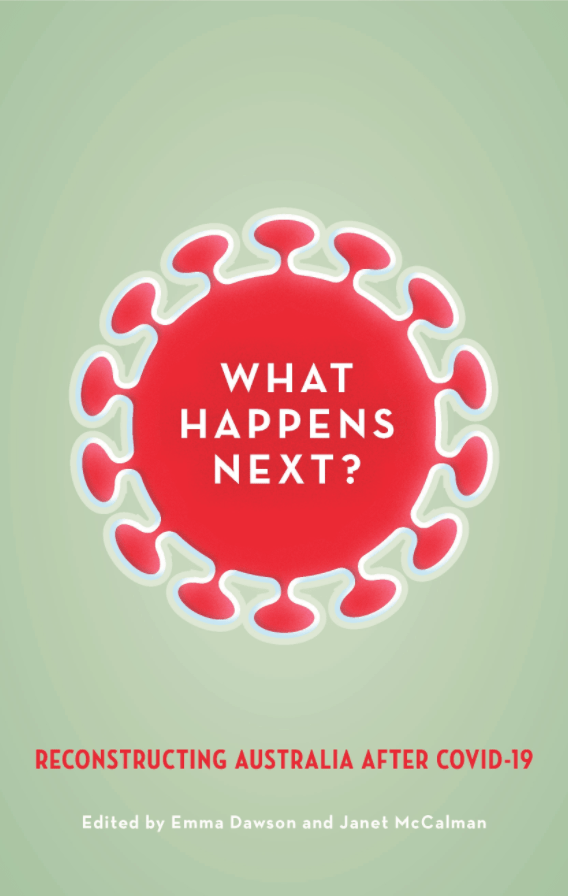 What Happens Next? Reconstructing Australia After COVID-19
What Happens Next? Reconstructing Australia After COVID-19
Eds. Emma Dawson & Janet McCalman
Of course our list would begin with our own anthology of essays from some of Australia’s most respected academics and leading thinkers. Edited by our very own Emma Dawson and dear friend of Per Capita Janet McCalman, What Happens Next? sets out a progressive, reforming agenda to tackle the twin crises of climate change and inequality. It provides a framework through which our collective effort can be devoted to improving the lives of all Australians, and the sustainability of the world in which we live.
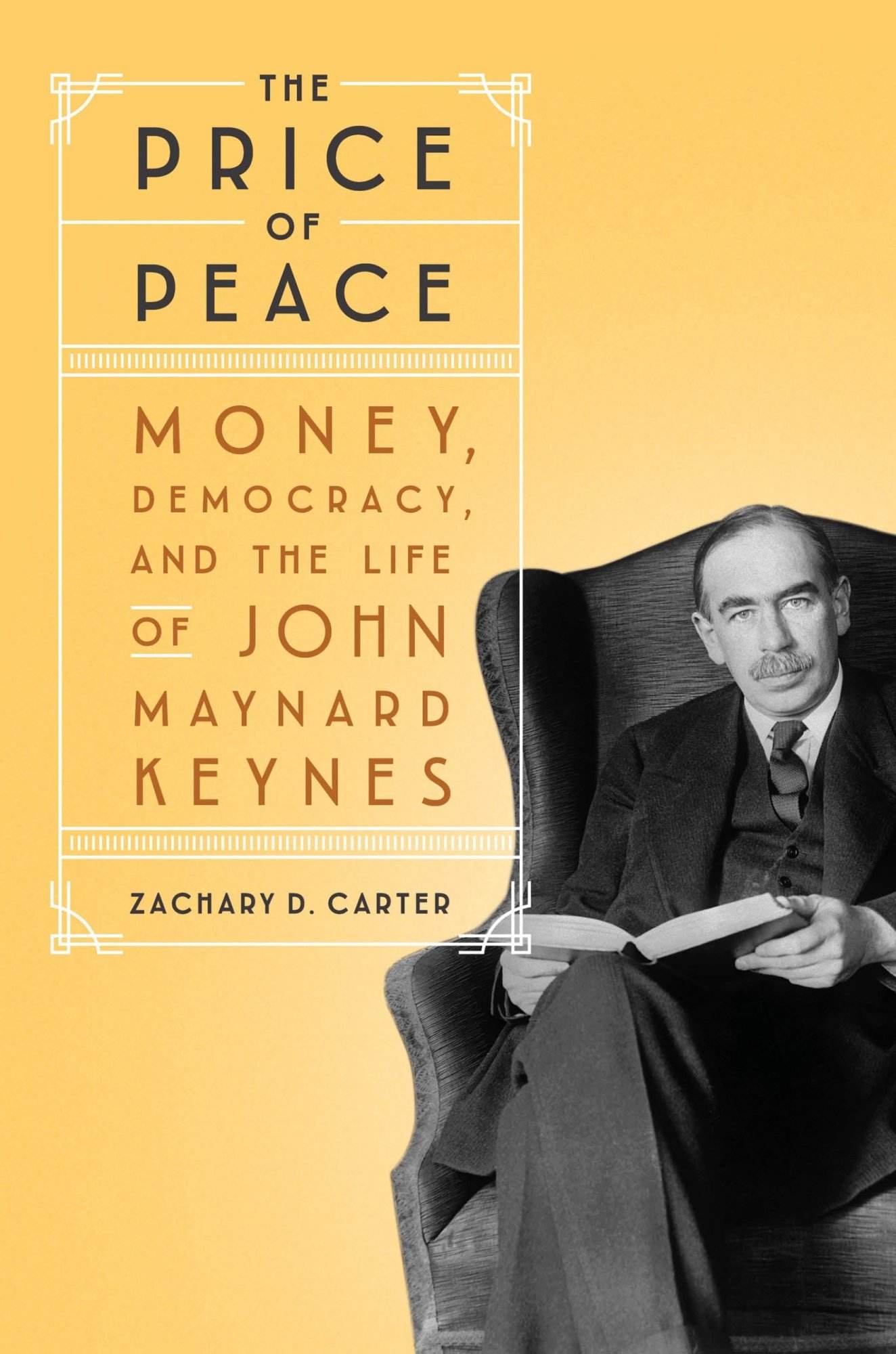
The Price of Peace: Money, Democracy, and the Life of John Maynard Keynes
Zachary D. Carter
A page-turning biography of world-changing economist John Maynard Keynes and the big ideas that outlived him. Keynes was not only an economist, as he is remembered today, but the preeminent anti-authoritarian thinker of the twentieth century, a man who devoted his life to the belief that art and ideas could conquer war and deprivation. A moral philosopher, political theorist, and statesman, Keynes immersed himself in a creative milieu filled with ballerinas and literary icons as he developed his own innovative and at times radical thought, reinventing Enlightenment liberalism for the harrowing crises of his day–which included two world wars and an economic collapse that challenged the legitimacy of democratic government itself.
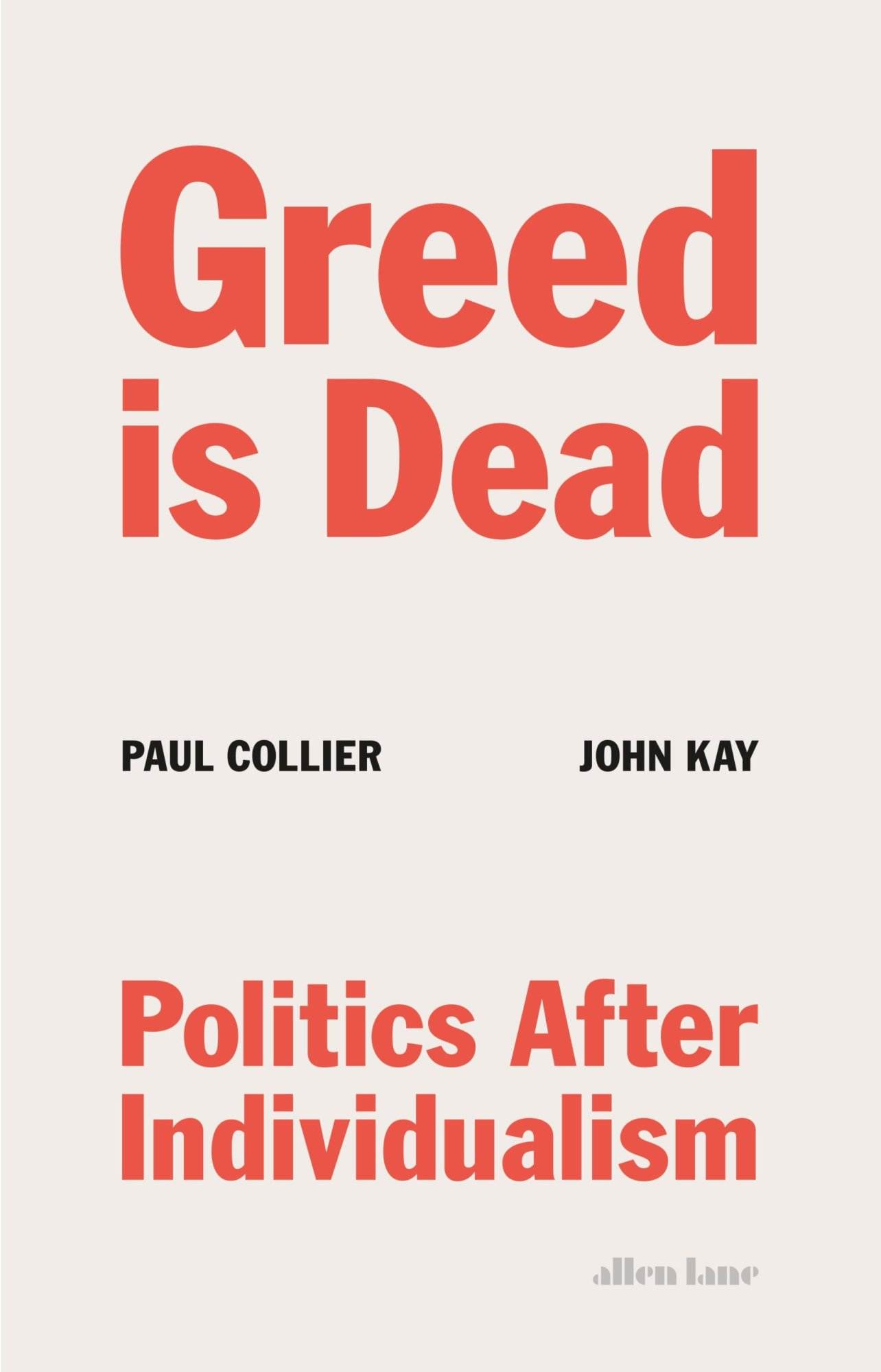 Greed is Dead: Politics After Individualism
Greed is Dead: Politics After Individualism
Paul Collier & John Kay
Two of the UK’s leading economists call time on selfishness as the engine of prosperity.
The idea that people are basically driven by individualism and economic incentives, and that prosperity and good societies come from top-down leadership, has dominated politics for the last thirty years (from some perspectives, much longer). This book shows that the age of homo economicus and centralisation is coming to an end. Instead, Collier and Kay argue that community and mutuality will be the drivers of successful societies in the future – as they are already in some parts of the world. They show how politics can reverse the move to extremes of right and left in recent years, that the centre can hold, and that if we think differently we can find common ground to the benefit of all.
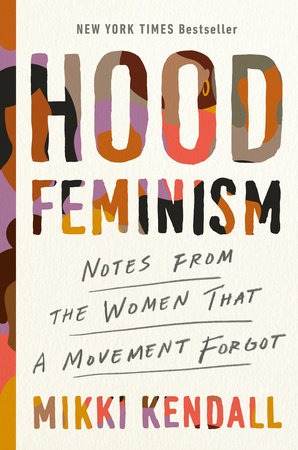
Hood Feminism: Notes from the Women that a Movement Forgot
Mikki Kendall
A potent and electrifying critique of today’s feminist movement announcing a fresh new voice in Black feminism.
In her searing collection of essays, Mikki Kendall takes aim at the legitimacy of the modern feminist movement arguing that it has chronically failed to address the needs of all but a few women. Drawing on her own experiences with hunger, violence, and hypersexualization, along with incisive commentary on politics, pop culture, the stigma of mental health, and more, Hood Feminism delivers an irrefutable indictment of a movement in flux. An unforgettable debut, Kendall has written a ferocious clarion call to all would-be feminists to live out the true mandate of the movement in thought and in deed.
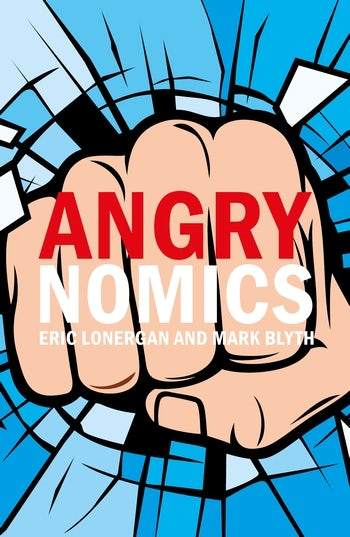
Angrynomics
Eric Lonergan & Mark Blyth
Why are measures of stress and anxiety on the rise when economists and politicians tell us we have never had it so good? While statistics tell us that the vast majority of people are getting steadily richer, the world most of us experience day in and day out feels increasingly uncertain, unfair, and ever more expensive. In Angrynomics, Mark Blyth and Eric Lonergan explore the rising tide of anger, sometimes righteous and useful, sometimes destructive and ill-targeted, and propose radical new solutions for an increasingly polarized and confusing world. Angrynomics is for anyone wondering, where the hell do we go from here?
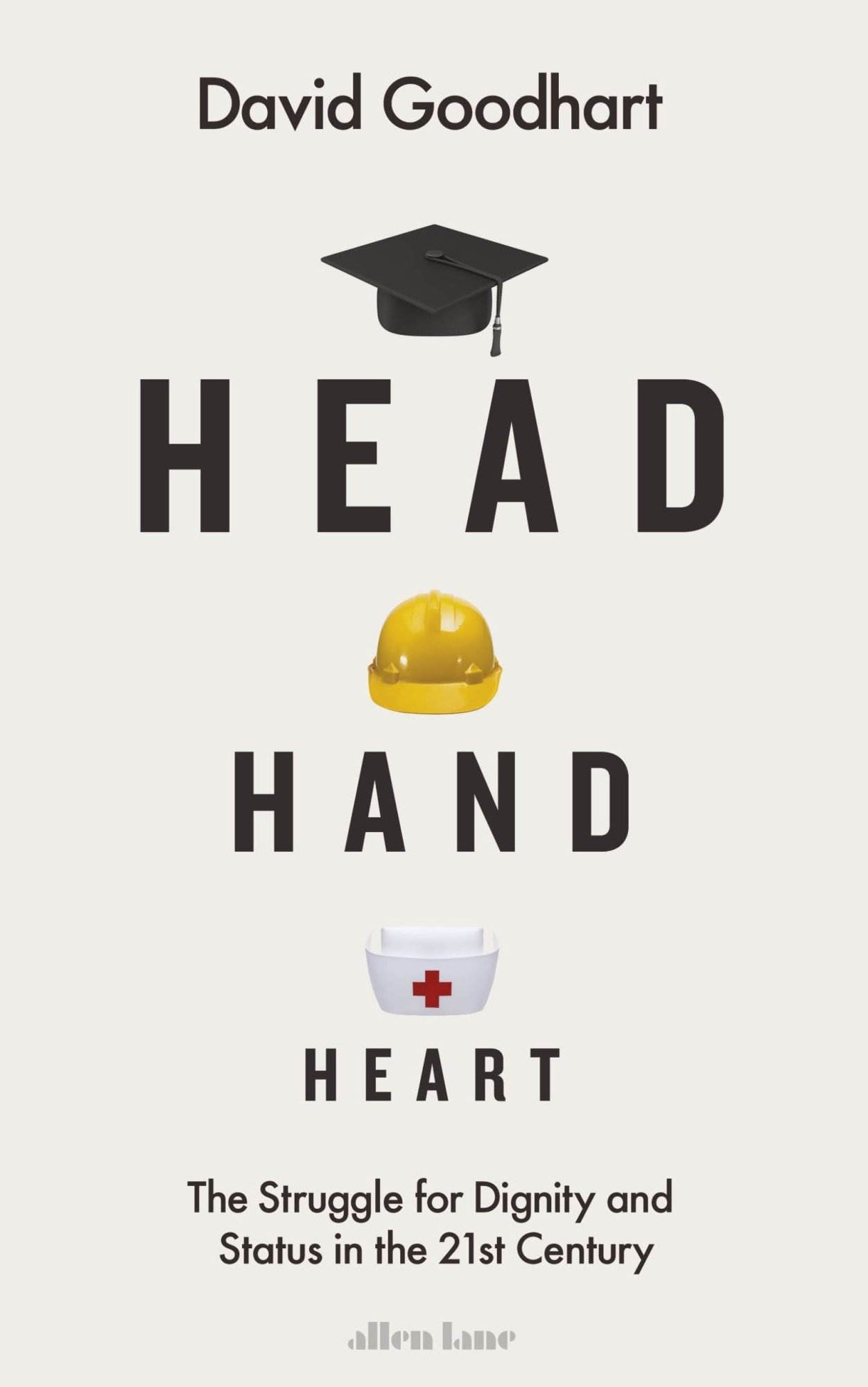 Head Hand Heart: The Struggle for Dignity and Status in the 21st Century
Head Hand Heart: The Struggle for Dignity and Status in the 21st Century
David Goodhart
A profound investigation into the deeper reason for our political alienation.
The coronavirus pandemic taught us something we ought already to have known: that care workers, supermarket shelf-stackers, delivery drivers and cleaners are doing essential work that keeps us all alive, fed and cared for. Until recently much of this work was regarded as menial by the the same society that now lauds them as ‘key workers’. Why are they so undervalued? In this timely and original analysis, David Goodhart divides human aptitudes into three: Head (cognitive), Hand (manual and craft) and Heart (caring, emotional). It’s common sense that a good society needs to recognise the value of all three, but in recent decades they have got badly out of kilter.
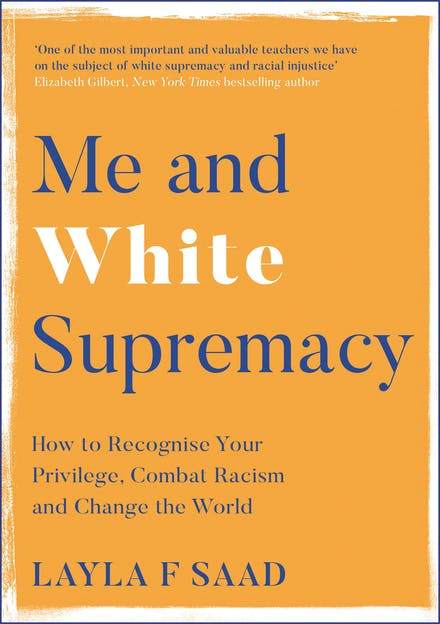
Me and White Supremacy: How to Recognise your Privilege, Combat Racism and Change the World
Laya F Saad
White supremacy is a violent system of oppression that harms Black, Indigenous and People of Colour.
And if you are a person who holds white privilege, then you are complicit in upholding that harm, whether you realise it or not. This is not my opinion. This is fact. And if you are person who holds white privilege, the question you should be asking isn’t whether or not this is true, but rather, what are you going to do about it Essential for all people who hold white privilege, this book will open your eyes and change your life.
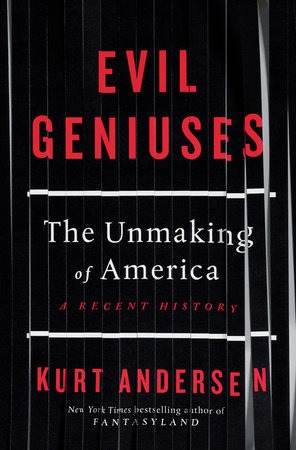
Evil Geniuses: The Unmaking of America
Kurt Andersen
When did America give up on fairness? The author of Fantasyland tells the epic history of how America decided that big business gets whatever it wants, only the rich get richer, and nothing should ever change—and charts a way back to the future.
Why and how did America take such a wrong turn? In this deeply researched and brilliantly woven cultural, economic, and political chronicle, Kurt Andersen offers a fresh, provocative, and eye-opening history of America’s undoing, naming names, showing receipts, and unsparingly assigning blame—to the radical right in economics and the law, the high priests of high finance, a complacent and complicit Establishment, and liberal “useful idiots,” among whom he includes himself.
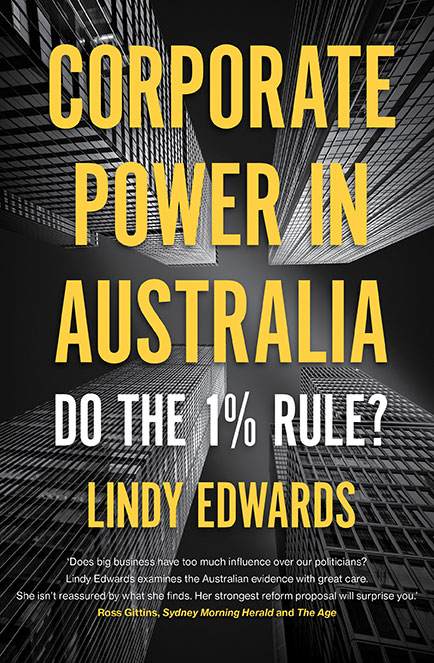 Corporate Power in Australia: Do the 1% Rule?
Corporate Power in Australia: Do the 1% Rule?
Lindy Edwards
Trust in Australian democracy has more than halved over the last decade, from 86% in 2007 to 41% in 2018. Part of this erosion of trust stems from a belief that big business has too much power. Community concerns have sparked major campaigns for a federal anti-corruption body and political donations reform. People are concerned that politicians are privileging the concerns of their mates in big business over the community or the public good. This book sets out to test the evidence for these public fears, considering mining companies and the mining tax; the banks and the financial advice scandals; Telstra and the NBN; News Ltd and media reform; Coles and Woolies versus the farmers; and attempts by government to reform contract laws and laws on the abuse of market power. It asks if the major corporates are disproportionately winning in our political debates? And if so, why?
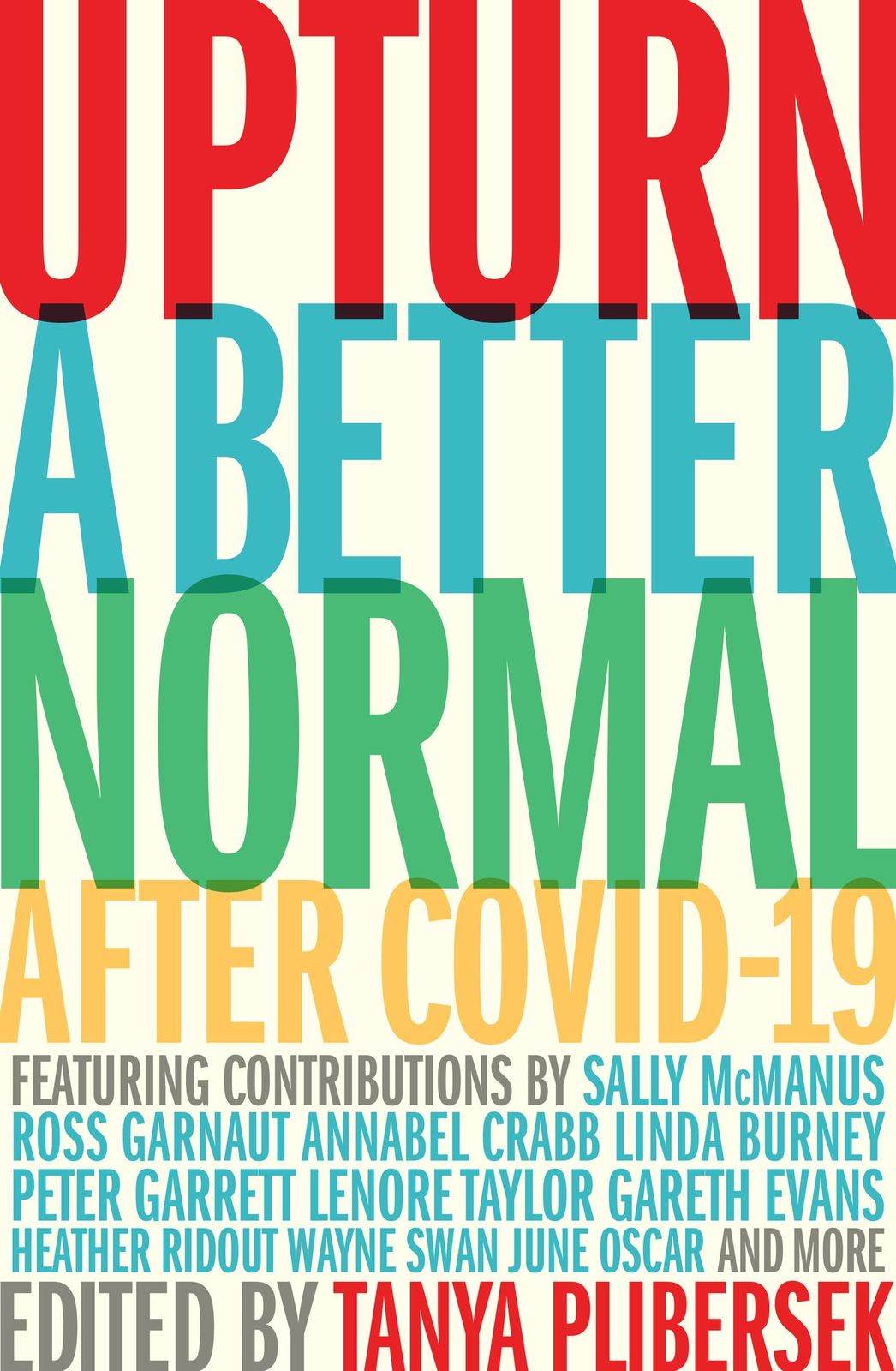 Upturn: A Better Normal After COVID-19
Upturn: A Better Normal After COVID-19
Ed. Tanya Plibersek
COVID-19 has resulted in changes none of us could have imagined, but what happens next?
If you had asked most people a year ago, they would have told you there was no way that school children could shift overnight to online learning; that it was impossible for banks to offer mortgage holidays; impossible to double unemployment benefits; impossible to house rough sleepers or put a hold on evictions; impossible to offer wages subsidies and definitely impossible to get Australians to stay home from the beach and the pub. But we did it. In Upturn Tanya Plibersek brings together some of the country’s most interesting thinkers who are ready to imagine a better Australia, and to fight for it. It is a compelling vision for a stronger economy, a fairer society and a more environmentally sustainable future.

